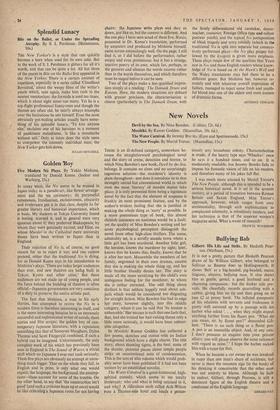Golden 'Boy
IN many ways, the No seems to be treated in Japan today as a pseudo-art, like flower arrange- ment and the tea ceremony its purposeful remoteness, fossilisation, exclusiveness, obscurity and irrelevance put it in that class, despite its far greater literary and historical import.ance, which is basic. My students at Tokyo University found it boring, scorned it, and in general were very ignorant about it; they preferred Shakespeare, by whom they were genuinely excited, and Eliot, on whose Murder in the Cathedral more university theses have been written in Japan than in England.
Their rejection of No is, of course, no good reason for us to reject it too; and one cannot pretend, either that the traditional No is dying, for as Donald Keene says in his introduction to M ishima's plays, 'There are today larger audiences than ever, and new theatres are befog built in Tokyo, Kyoto and other cities.' But these audiences are not made up of young people, and the force behind the building of theatres is often official—Japanese governments are very conscious of a duty to preserve ,the native artistic past.
The fact that Mishima, a man in his early thirties, has attempted to revive the No in a modern form is therefore interesting in itself, and is the more interesting because he is an extremely successful and sophisticated writer of novels, short stories and film scripts; the golden boy of con- temporary Japanese literature, with a reputation something like that of Somerset Maugham, Dylan `Thomas and Scott Fitzgerald combined, if such a hybrid can be imagined. Unfortunately, the only complete work .of his which has previously been seen in England is The Sound Of Waves, a trivial idyll which no Japanese I ever met took seriously. These five plays are obviously an attempt at some- thing much bigger. That on the whole they fail, in English and in print, is only what one would expect; the language, the background, the assump- tions—these account for some of the trouble. On the other hand, to say that 'the construction isn't good' (and such a criticism leaps up at once) would be like criticising a Japanese room for not having chairs: the Japanese write plays and they sit down, just like us, but the context is different. And the one play I have seen acted of these five, Han Jo, presented in Dr. Keene's translation, performed by amateurs and produced by Mishima himself, came across astonishingly well. On the page, I still find it, as I did before the performance, rather empty and even pretentious; but it has a strange, inactive poetry of its own, which lies, perhaps, in the gestures and silences the words assume rather than in the words themselves, and which therefore must be staged before it can be seen.
Two of the plays make a less qualified impres- sion simply at a reading : The Damask Drum and Kantan. Here, the modern situations are defined with greater precision, the characterisation is clearer (particularly in The Damask Drum, with the firmly differentiated old caretaker, dance- teacher, couturier, Foreign Office type and callow postwar youth), and the typical No juxtaposition of bleak tragedy and witty comedy (which in the traditional No is split into separate but consecu- tively performed plays—the No play proper fol- lowed by the kyogen) is given more emphasis. These plays retain few of the qualities that Yeats saw in No, and those English readers whose know- ledge of No is based on At the Hawk's Well and the Waley translations may feel them to be a different genre. But Mishima has, however re- motely and with whatever overall impression of failure, managed to inject some fresh and youth- ful blood into one of the oldest and most austere of dramatic forms.
ANTHONY THWAITE










































 Previous page
Previous page